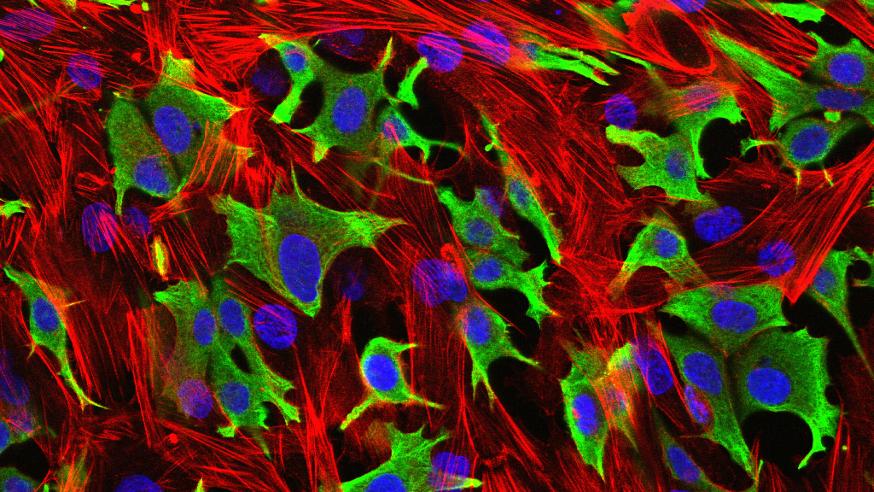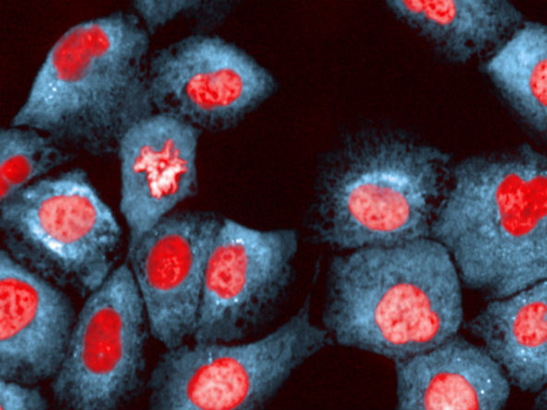
Breast cancer cells (green) invading through a layer of fibroblasts (red). Credit: Luke Henry, ICR.
Many more people with breast cancer could get tested for mutations in the BRCA1 and BRCA2 genes under new criteria, a study suggests.
Researchers are recommending new criteria for gene testing based on simple information that is routinely available at cancer diagnosis, such as age and sex.
The study by a team at The Institute of Cancer Research, London, and The Royal Marsden NHS Foundation Trust have found that the new criteria were twice as effective at identifying people with BRCA mutations as existing criteria. They were also much simpler to use.
Identifying if a breast cancer is due to a BRCA gene mutation is vital to selecting the right treatments for them, and could help widen access to new precision drugs. It also gives relatives of people with mutations the opportunity to have a test to see if they are at high risk of cancer, before they get the disease.
If they have inherited the mutation they can then choose to have screening or cancer prevention surgery.
The National Institute for Health and Care Excellence (NICE) recommends that anyone with a 10% chance of having a BRCA mutation should be offered genetic testing. Very complex criteria based on family history of cancer are used to work out who reaches this 10% threshold.
New criteria very cost-effective
In the new study, which was funded by the NIHR Biomedical Research Centre at The Royal Marsden and The Institute of Cancer Research (ICR), five simple criteria were used to decide who should be tested.
Some 1,020 people meeting the criteria were tested and 110 had BRCA mutations. If the existing family history criteria had been used only 53 of the patients with mutations would have been tested – so half of the mutations would have been missed.
Because the new criteria are so simple breast cancer patients could access testing at their cancer clinic appointment rather than having to go to a separate appointment to see if they were eligible for testing. Patients found this much easier, and it also meant the results were available much sooner.
Everyone with a BRCA mutation saw the genetics team to discuss the results and so testing in the wider family could be coordinated.
The study team also showed that using the new criteria would be very cost-effective for the NHS mainly because of the cancers that would be prevented in relatives.
The results of the study will be presented tomorrow (Monday) at the annual National Cancer Research Institute conference in Liverpool.
Help transform breast cancer research by supporting our new programme of research into hormone receptor-positive breast cancer.
Precision medicines
Study leader Professor Nazneen Rahman, Head of Cancer Genetics at the ICR and The Royal Marsden NHS Foundation Trust, said:
“Our study shows bringing BRCA gene testing into the cancer patient pathway and using simple criteria is a more patient-centred and more effective way of organising BRCA testing, as well as being a more efficient use of NHS resources.
“It allows us to help more cancer patients to benefit from precision medicines, and it helps us prevent cancer occurring in healthy people.
“We are now working with other centres across the UK, Europe and America to roll out the system, so that many more people can benefit and many more cancers can be prevented.”
Genetic testing a vital tool
Professor Nicholas Turner, Professor of Molecular Oncology at the ICR, and Consultant Medical Oncologist at The Royal Marsden NHS Foundation Trust, said:
“We have welcomed being able to offer BRCA testing to our breast cancer patients. These new criteria make it very easy to know who should be tested and patients have been very pleased to have access to gene testing.
“Knowing if a BRCA mutation has caused the cancer helps us give people the best treatment.”
Professor Paul Workman, Chief Executive of the ICR, said:
“Now that we’re in an age of precision medicine, genetic testing has become a vital tool to help identify those patients who would benefit most from targeted treatments.
“This study creates a smarter framework for selecting people who would qualify for BRCA gene testing and allows access to genetic information to be streamlined in the clinic.”
More ICR updates from NCRI 2017
- Blog: World-class research on show in Liverpool
- News: Dr Gerhardt Attard wins Cancer Research UK Future Leaders Prize
- Video: Dr Gunther Boysen on immunotherapy in 2018
- News: Big data analysis predicts risk of radiotherapy effects
- Blog: How 3D tumour models grown from patients’ cell samples could improve drug discovery
- Video: Dr Anguraj Sadanandam on colorectal cancer research in 2018
- Blog: Understanding cancer evolution
- Video: Dr Bissan Al-Lazikani on computational research, machine learning and big data in 2018
- Blog: Take home messages from the conference
